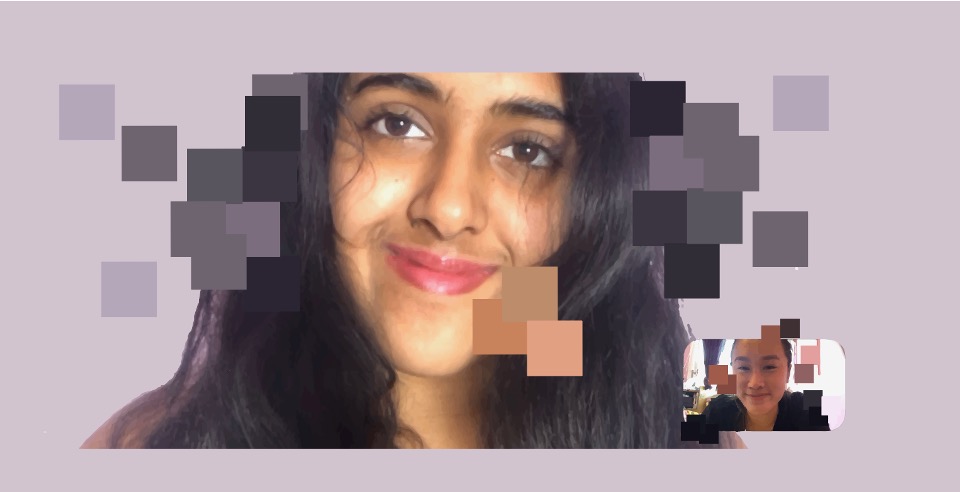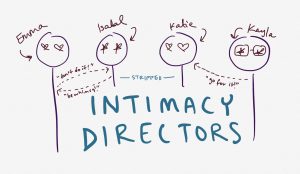This piece appears as part of Carrying On, an ongoing column written by members of the Voice masthead.
Natalie
Written and Read by Amanda Chu
Natalie Chaudhuri does not wear pants. On a snowy campus, it’s not unusual to run into Natalie wearing a floral dress, legs bare, shivering. Rumor has it she owns two pairs, but with classes online, I may never find out if that’s true.
I met Natalie in my first class on my first day of freshman year, a proseminar on international politics and fiction. While I would like to say our friendship started off then, rattling off short bios and complimenting each other’s lipstick, that story would be far from the truth. Really, the only thing I remember from that day is being cold-called, stammering out a bullshit answer, and feeling like I wasn’t cut out for college. While I’m sure Natalie was there, I have no memory of her that first day at all.
In typical Georgetown fashion, Natalie and I could have become friends in a variety of ways—in that freshman proseminar, in philosophy lecture, at a club meeting, at a pregame, the list goes on. She sat next to me in those stressful 90-minute proseminars, always equipped with something brilliant to say. Some days I would run into her during 8 a.m. office hours, her wearing a floral dress and eyeshadow with a document of ideas ready, while I had slept on the floor of my dorm in my clothes for the next day, worried I would oversleep. After that proseminar, we had lunch a couple of times, and I saw that she was in the Voice, so I decided to join too. Later, we were assistant Opinion editors together, catching up at weekly board meetings and exchanging ideas for future pieces. If it weren’t for Natalie, I probably never would have been part of the Voice, something I cannot imagine.
Still, Natalie and I didn’t become close friends until much later, in the second semester of sophomore year when the excitement and eagerness of our first year had wound down. It was Valentine’s Day and we both didn’t have plans, so we got dinner. In the course of our conversation, I had, using a series of vague questions, somehow deduced we had the same campus therapist. We ended up having a long discussion about why we chose to seek therapy, suddenly able to speak honestly and even humorously about our pain without expectations of consolation or pity.
This spring, when the university announced classes would be online for the remainder of the semester, Natalie and I were on campus for break. We spent the week together and much of the weeks after as some of the last few students on campus. We brought take-out to my empty dorm and spent nights sharing embarrassing stories, ranting about our families, and plotting last-minute socially-distanced schemes before we had to leave campus indefinitely.
Back in our homes in quarantine, Natalie and I are very different people. By the time I’ve woken up, Natalie will have meditated, supported a domestic violence survivor, written a Leisure article, and come one step closer to flipping her state, all while being one time zone behind. Despite our misaligned schedules, we’ve communicated frequently these last few months, texting each other random thoughts throughout the day and talking for long hours on the phone.
If you asked me what I like best about our friendship, it’s that talking to Natalie feels freeing. As two Asian American women, we can talk openly about subjects our traditional immigrant families regard as taboo: issues relating to race, class, mental health, relationships, and sex. While I can confide in my female friends of all races, Natalie’s sharing of my Asian American identity makes our conversations particularly healing and empowering.
I can’t emphasize enough the importance of strong female relationships. I don’t think they’re portrayed often enough in the media and valued enough among women. Our society prioritizes romantic relationships, and while they are important, it’s necessary in a patriarchal country that women have female friends with whom they can speak openly about issues and experiences specific to being a woman. This is particularly important for minority women, who may come from less progressive cultures.
Even before we became close, Natalie had taught me how to be brave. She wears floral dresses and shimmery eyeshadow on the most ordinary days, and she always tells you what she thinks, unafraid. In the time that I’ve known her, I’ve seen Natalie fight tirelessly to end gun violence and write courageously about her experiences with grief and loss. So often it feels easy to stay silent and hide, but Natalie pushes me to say how I feel and to speak up for what I think is right. Most people who know her would agree when I say that Natalie is a source of light.
As we’re approaching the start of an entire semester online, it’s important to remember that friendships can be made and fostered virtually. For incoming freshmen, there’s nothing I can say that will make up for the drastically different semester to come. Given the widespread sense of global loss, it may feel irrational or worthless to even complain. The loss of a typical freshman year may be difficult to describe or quantify, but it’s still something tragic to lose. Many of us have dreamt and worked for years to be admitted to this school. We spend the last year of high school imagining what the next year will be like and the people we will meet. While so much of Georgetown’s culture is rooted in in-person events and we often hear stories of friends meeting on the first day, after a party at Epi, or on freshman ESCAPE, it’s important to remember that friendships in college can form in other ways. Talking to Natalie on the phone, I often forget that she’s two thousand miles away. Hearing her voice, I feel as though I’m back on the floor of my dorm and she’s right there in the room with me.
Though virtual friendships may require more effort, they are especially important for freshmen to make during this time as they adjust to college alone, miles away from our actual campus. One of the things I love about college is that the next person to change your life could be less than a 10-minute walk away. These special people will continue to exist, but you might have to talk to them on the phone instead. Freshmen, reach out to your classmates, talk to your orientation members, sign up for clubs. Your best friend could be in your first class of freshman year. They might even be in the Voice. Join the Voice!
Amanda
Written and Read by Natalie Chaudhuri
Amanda Chu loves scarves. When we FaceTimed last night, she was wearing her staple beige scarf, an accessory she wears even in the dead heat of July. Amanda’s affinity for warmth is coupled by her affinity for hot takes, such as liking rats. Even for a Georgetown student, liking rats is almost as controversial as hating scooters. Clearly, Amanda and I don’t agree on everything—but we do agree on the value of our incredible friendship.
Amanda and I met in our proseminar class in the fall of 2018, when we were both bright-eyed freshmen unsure of what we were getting ourselves into, but so desperate to please that we were the first ones there. It ended up feeling like Elle Woods’ first day of class in Legally Blonde—when my professor cold-called me and expressed disapproval at my answer, I wasn’t sure whether I’d be cut out for this college thing. Even worse, my professor’s office hours were at 8 in the morning. You know a class is going to be bad when the professor mandates office hours at what college students would consider the break of dawn.
But there was one bright spot to that difficult day that I will always remember: the girl sitting to my left, eating a granola bar, as poised as the figure skater that she is. We didn’t speak to each other.
Slowly, Amanda and I went through that difficult class together, running into each other during the early morning office hours and trading small comments about how stressful they were, then saying goodbye until class started. We sometimes saw each other at meetings for Voices, the opinion section of the Voice. Both of us would eventually become assistant Opinion editors, before Amanda rose to Opinion Exec and I would decide to leave the board. Even from the beginning, we had forged the bond of a shared love of words and thought-provoking opinions, a bond not easily broken.
During freshman year itself, though, Amanda and I only hung out a few times. The one memory that really stays with me is when we were in her dorm room, eating green grapes on the floor—pretty classy for a college hangout. Months passed and we lost touch, but in the early months of 2020, when Amanda walked into my four-person Creative Writing Club, we began reconnecting. All it took was one conversation, one Georgetown play, one dinner at Mai Thai, and soon we were used to being in each others’ lives again. We were on the cusp of becoming closer friends when the world turned inside out.
Move-out in spring 2020 for most college students was probably a tumultuous blur. I was fortunate that mine was mostly tranquil. What I remember clearly is sipping spicy Oki Bowl soup with Amanda in a McCarthy study room because she wanted to celebrate my birthday. The rest of the new world order has similarly been colored by memories of Amanda, though all of them were through an iPhone screen. Perhaps we can chalk it up to serendipitous timing: Amanda and I had Facetimed over spring break before the shift to online, and it soon became a habit when screens were one of the few forms of communication permitted. Amanda and I came to a consensus that we were going to use quarantine to write the next King Lear. We traded stories and poems, news articles and music. We played board games virtually and did creative writing prompts together. We tried to make sense of the world around us, just as we tried to do everything we could to feel less alone.
If you asked me what I like best about Amanda, it’s this: she will spend the entire day writing a one-paragraph poem while listening nonstop to one Weeknd album. She will respond to stressed texts you send at 1:00 in the morning, and, though I haven’t been awake to find out, texts you send at 6:00 in the morning. She will go days without stepping outside until she suddenly goes running for hours in the rain. If you asked me what I like best about Amanda, it’s that she is spontaneous, hard-working, and probably going to be the next Anthony Fauci, but she will always be there when you are at your lowest.
During our freshmen year, Amanda texted me a gif that said, “He may be dreamy, but he is not the sun. You are.” Even from the beginning, my friendship with Amanda was one that showed me what empowerment looked like—what being the best version of yourself meant. Talking to Amanda was like talking to a more thoughtful version of myself. Though Amanda has an identical twin, we were kindred spirits in another way: a similar Asian background, a similar understanding of feminism and relationships, and a similar love for all forms of writing that cannot be put into words.
Especially right now, as freshmen navigate the strangest fall anyone has had to live through, it’s easy to feel like you’re missing out on the best times of your life. But if Amanda and I’s friendship has taught us anything, it’s that connections can bloom virtually, that it’s never too late to make friends. Someday you’ll get to eat green grapes with them on the floor—but until then, it’s enough to know that they will always be on the other end of the phone.








[…] Carrying On: Becoming friends at a distance The Georgetown Voice “iphone rumors when:1d” – Google News […]